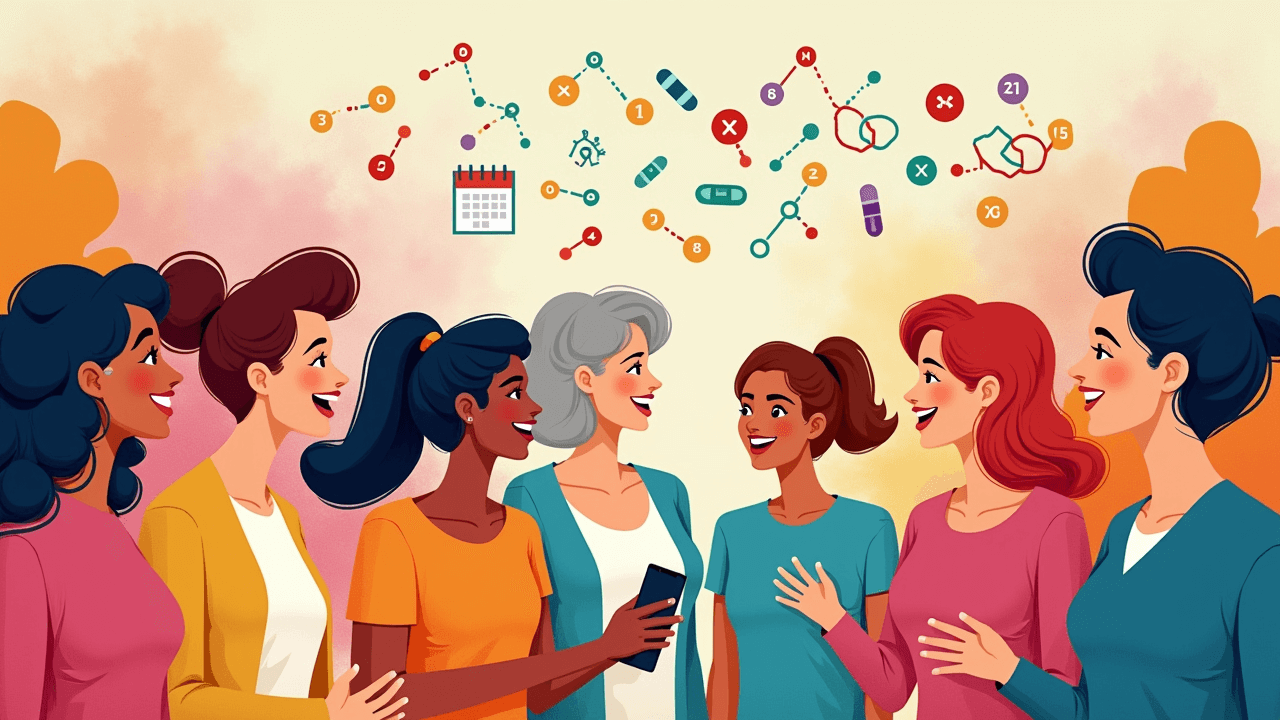Okay, so you know how sometimes you hear these things and you’re like, “Wait, is that really true?” That’s what we’re looking at today. We’re doing a deep dive on birth control and menopause specifically—does taking birth control affect when menopause starts?
Understanding the Basics
Yeah, it’s a question a lot of people have. It makes sense, though, right? If birth control can, like, manage hormones to prevent pregnancy, yeah, maybe it could also delay menopause somehow, right? Like it’s pushing it back or something. It seems logical.
But to really get into it, we have to break down what’s actually going on with both birth control and menopause, like the biology behind it all. Totally get ready for a crash course in hormones and oocytes. Oh, I think I can handle it.
The Misconception About Menopause
So one of the biggest misconceptions out there, and I’ll admit, I believed this for a while too, is that menopause is all about, like, running out of eggs.
Yeah, that’s a really common misunderstanding, right? The truth is way more interesting. You’re actually born with all the eggs you’ll ever have.
No way.
Seriously, yep. And get this, that number starts declining even before you’re born.
Wait, so even before we enter the world, our bodies are already doing this whole egg balancing act.
Exactly. By the time a girl gets her first period, most of those initial eggs are already gone. It’s just a natural part of how our cells age.
Wow. See, I had no idea it started that early.
Why Do We Have So Many Eggs?
But why even have so many eggs in the first place? It seems like way more than you’d ever need.
Well, think of it this way. It’s kind of like your body’s way of hedging its bets.
You see, not all eggs are created equal. Over time, their quality naturally declines, and that means the chances of a healthy pregnancy decrease too. Even years before menopause might even be on the radar.
So having this big pool of eggs to start with just increases the odds of a healthy pregnancy later on.
You know, it’s like a quality control system for your, for lack of a better term, your reproductive future.
That’s actually pretty amazing when you think about it.
Quality Over Quantity
So it’s really more about quality than quantity when it comes to eggs, huh?
Exactly.
What Really Happens During Menopause?
But if it’s not about running out of eggs, what’s actually going on in menopause? Then, where do all hormones come in, right?
So we’ve talked about eggs, but let’s talk about the ovaries for a sec. They’re basically like tiny little hormone factories in your body.
Okay, I like that—tiny factories, right?
Primarily, they’re producing estrogen and progesterone, these hormones that are like the VIPs of your menstrual cycle. But as you get older, those factories naturally start to slow down production.
You know? They get tired.
Exactly, and that’s really what menopause is all about—the decline in those key hormones.
So menopause is less about the eggs themselves, and more about, like, the hormones those eggs depend on to do their thing.
You got it?
The Role of Hormones
And that brings us back to this whole birth control question.
See, birth control, especially the hormonal kind, it works by kind of tweaking those hormone levels. It’s like it’s telling those factories to put things on hold for a bit, like pressing pause at the production line, not shutting the whole factory down.
Perfect analogy.
But, and this is important, even when you’re on birth control, those ovaries, they’re still aging. That natural decline in hormone production keeps going, whether you’re taking birth control or not.
So it’s like taking a break doesn’t change how long the factory’s ultimately gonna last. It’s still gonna slow down eventually, exactly.
Birth Control and Menopause Onset
And that’s why, you know, birth control doesn’t actually delay menopause. It’s more like it’s managing things—managing those hormone levels while all those other changes are happening in the background.
This is making a lot more sense now.
But what about those women who say that being on birth control actually helped them with their menopause symptoms?
I think we saw that mentioned in one of the articles we looked at, yeah, and that’s a great point to bring up.
Managing Menopause Symptoms with Birth Control
While birth control can’t, you know, stop menopause from happening, it can actually provide some relief from certain symptoms for some women, like certain types of birth control. They can help regulate those hormone fluctuations that are happening, which can help with things like hot flashes or irregular periods.
So it’s more about, like, managing that transition, not delaying the inevitable, right?
Exactly, think of it like taking pain medication for a broken bone. It’s not gonna heal the bone any faster, but it sure makes the whole experience a lot more bearable.
That’s a good way to put it.
The Early Decline of Eggs
Okay. Before we wrap up, I wanna circle back to something we touched on earlier—this whole idea of our eggs declining even before we’re born.
Wild, right?
Totally. It’s just this crazy concept to wrap my head around.
It is pretty mind-blowing, especially when you start thinking about, like, the generations that came before you.
I mean, that became you that was already present in your grandmother’s body.
Whoa.
You know, I never thought about it that way. It’s like this weird connection to my grandma that I never even knew about.
Makes you appreciate how complex this whole system is.
Absolutely, it shows just how powerful and intricate the female body really is.
No kidding.
Yeah, and it underscores that menopause is a completely natural part of the whole cycle, yeah, not some sort of malfunction.
It’s easy to forget that sometimes.
Totally.
Birth Control’s Role in the Bigger Picture
So, to bring it back to the original question, birth control doesn’t actually delay menopause. It’s more about managing the—you called it a symphony earlier, that hormone symphony—while our bodies naturally transition.
It’s like, whoa. We’re all just part of this bigger picture, right?
It really puts things into perspective. And you know, it reminds me too, thinking about it like that, that menopause. It’s not like some failure or anything. It’s just this natural transition. It’s built into how our bodies work, exactly.
So to bring it all back, you asked about birth control and menopause, and really, it seems like birth control doesn’t delay menopause. It’s more like, what you said, managing those hormones during that transition.
Exactly.
And I think understanding that difference can help people make more informed choices about their, you know, reproductive health, whatever stage of life they’re in.
For sure.
Knowledge is power, yeah.
So let’s recap, for everyone listening:
Menopause, it’s not just about running out of eggs. It’s about those hormone levels, especially estrogen and progesterone, declining.
And hey, while birth control might help some women with those menopause symptoms, it doesn’t change when menopause actually happens. It’s a natural process.
It really is.
And what I think is so cool is we’ve gotten to really see how amazing and complex the female reproductive system is.
Totally, it makes you think, right?
FAQs
Does birth control delay menopause?
No, birth control doesn’t delay menopause. It manages hormone levels during the transition but doesn’t change when menopause occurs.
What causes menopause?
Menopause is caused by the natural decline in hormone production, particularly estrogen and progesterone, by the ovaries as they age.
Can birth control help with menopause symptoms?
Yes, certain types of birth control can help manage menopause symptoms like hot flashes and irregular periods by regulating hormone fluctuations.
Are women born with all the eggs they will ever have?
Yes, women are born with all the eggs they will ever have, and the number of eggs starts declining even before birth.
Is menopause a natural part of aging?
Yes, menopause is a completely natural part of the aging process and not a malfunction of the body.
Your Hosts

Alex & Maria
Join Alex Thompson and Maria Davis as they navigate the fascinating world of knowledge. With their combined expertise and passion for learning, they simplify the complex and make every episode a journey worth taking.

